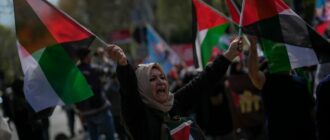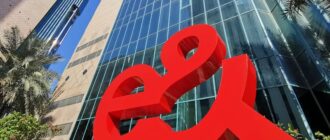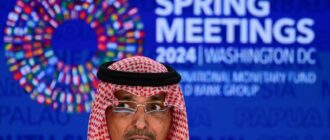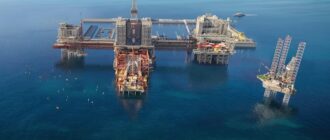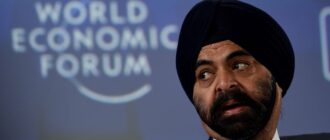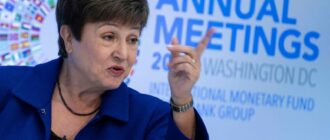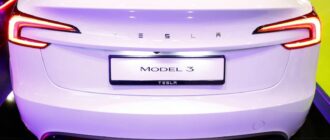Iraq’s plan to be a connector in the region is boosted by new agreements and Gulf investment
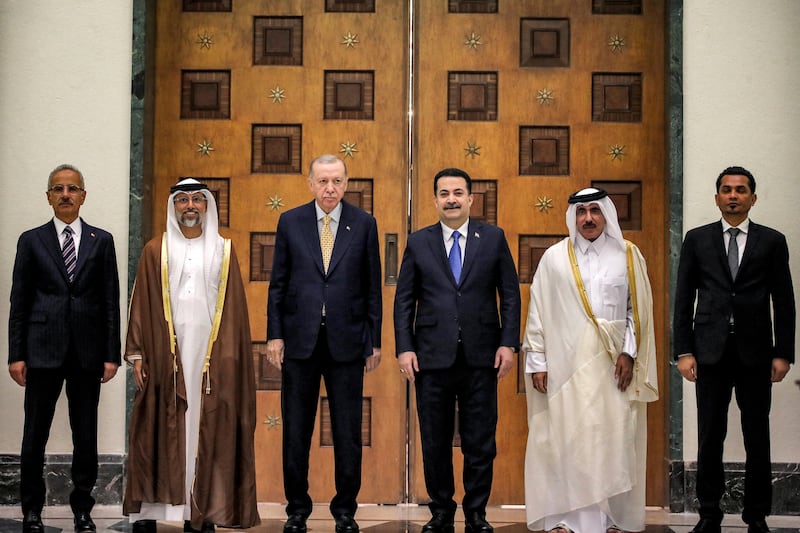
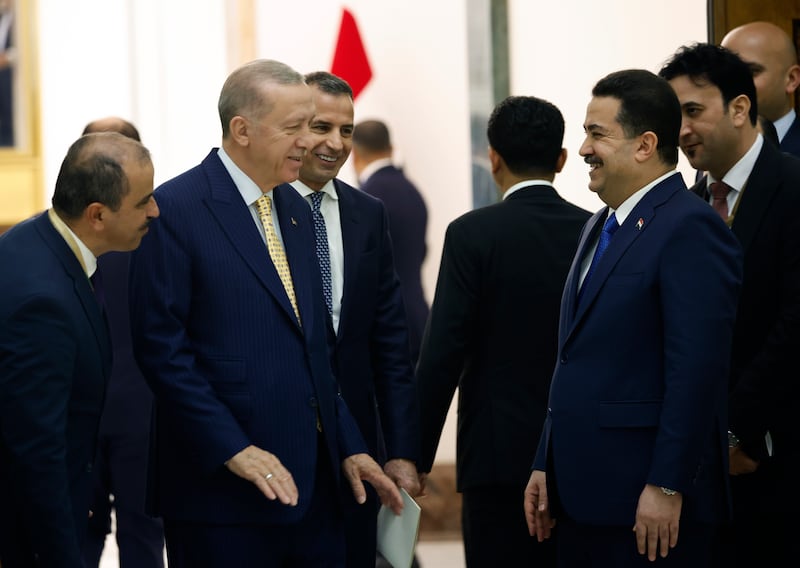
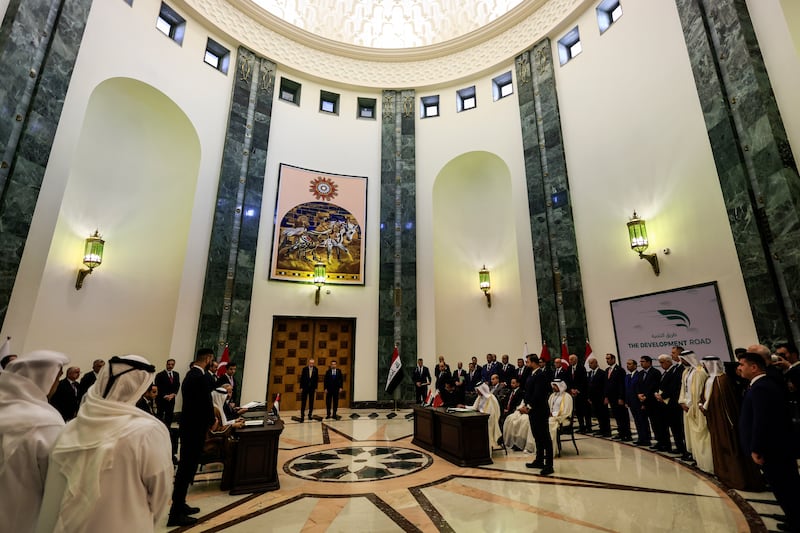
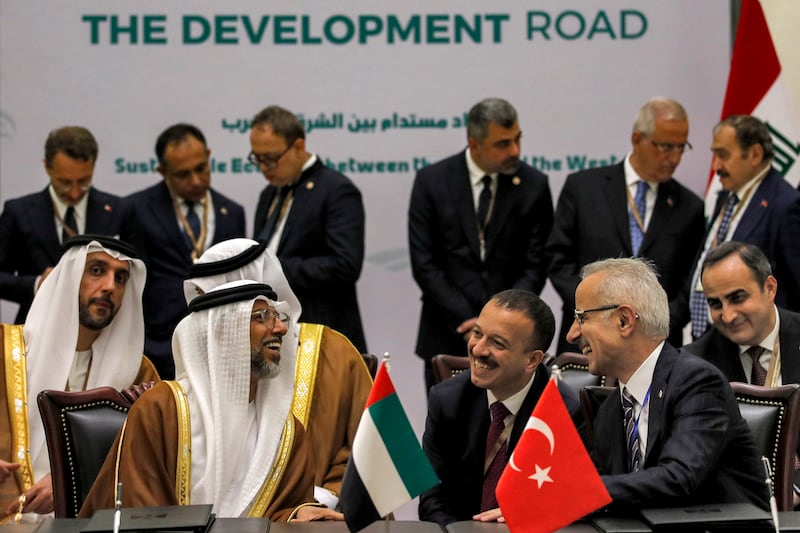
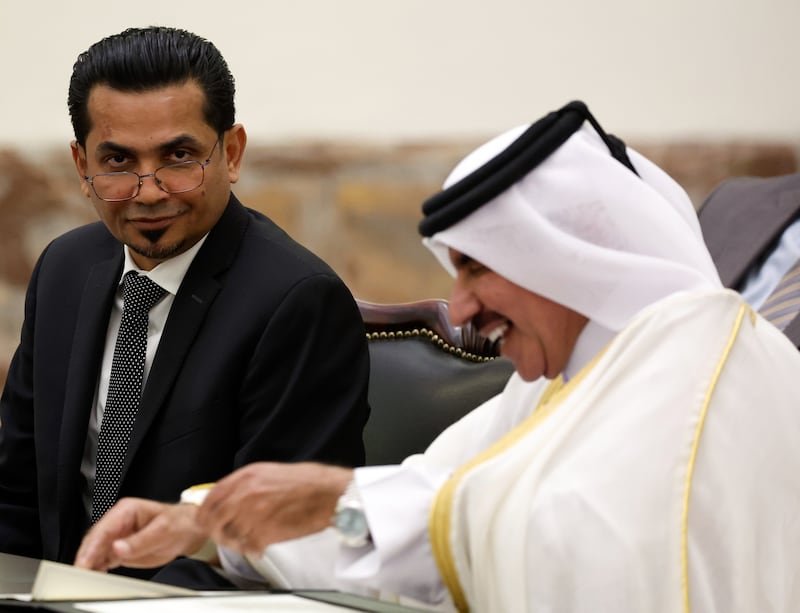
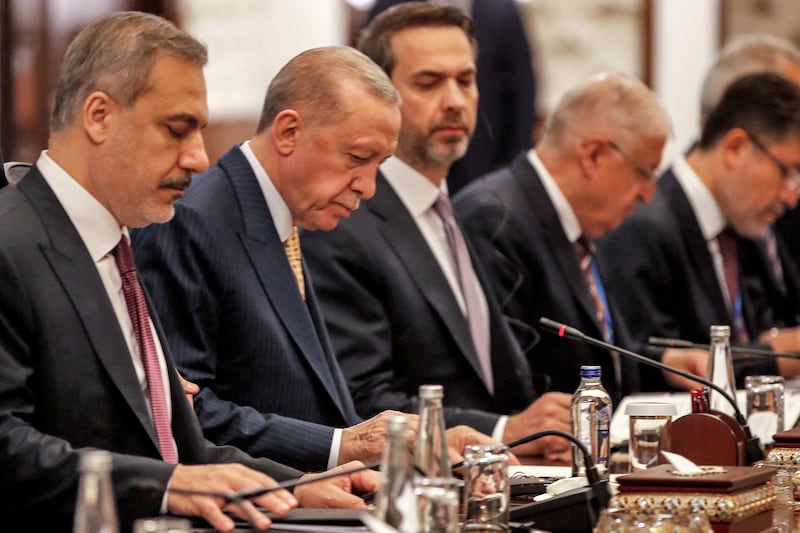
Sinan Mahmoud Listen In EnglishListen in ArabicPowered by automated translation
Iraq’s ambitious $17 billion Development Road project, which could rival the region’s only existing international maritime route via the Suez Canal, has made significant progress in recent weeks.
On Monday, Iraq, Turkey, Qatar and the UAE signed a preliminary agreement in Baghdad for joint co-operation on the project. The signing took place during the Turkish president Recep Tayyip Erdogan’s visit to Iraq, his first in 13 years, where political and economic ties were discussed.
Two weeks ago, Iraq signed an agreement with Kuwait to establish a telecom route in tandem with the Development Road to Europe. On the surface, the telecoms deal will provide a connection between Gulf states and Europe, while the land corridor could provide a much-needed economic boost for the region.
Announced last year, the cross-border transport network aims to connect the Gulf countries with Turkey through road and rail.
It involves building about 1,200km of two-way rail tracks and a new motorway, from Al Faw in Basra province to the Turkish border in the north.
The Development Road faces competition from an established trade corridor like the Belt and Road Initiative (BRI), the infrastructure and trade project that connects China with 150 countries in South-East Asia, Central Asia, Russia and Europe.
An agreement to form the India-Middle East-Europe Economic Corridor (Imec) was signed at the G20 meeting in September, with a US-backed connectivity route from India to Europe that aims to boost trade and cut transport costs.
Project partners
Hayam Al Yasiri, Iraq’s Minster of Communications, said the agreement with Kuwait was the first of several projects for underwater and transit cables to improve Iraq’s connectivity. She said the ministry expects to sign an agreement with Saudi Arabia to install a third submarine cable for Iraq in Al Faw in Basra, where the massive Development Road project begins.
This month, AD Ports Group signed a preliminary agreement with the General Company for Ports of Iraq to develop Al Faw Grand Port and its economic zone.
The Development Road was first announced as a government project in 2010. Al Faw is expected to be one of the largest ports in the world once completed.
South Korean company Daewoo E&C is set to complete the first phase of five jetties at the port this year, a government official in Basra told The National. It is now erecting bridges linking main berths to its container yard, he added. It will start operations next year.
A tender for other phases is expected to be issued in June, he said.
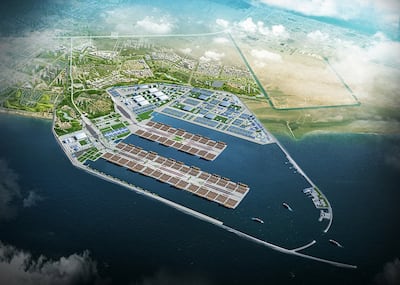
An aerial view of the Grand Port of Al Faw, Iraq, with the first phase of the project already under way. Photo: Daewoo E&C
In May last year, Iraq invited transport ministers and officials from the GCC, Iran, Turkey, Syria and Jordan to a one-day conference in Baghdad to showcase the project.
“During that conference only Qatar, UAE and Saudi Arabia seemed interested and wanted to check all details through their inquiries mainly on technical and financial issues,” another government official told The National.
After that meeting, he said, only Qatar and UAE stayed in contact with the Iraqi side, sending their delegations to Baghdad and inviting Iraqis for discussions.
“They were serious, unlike others, and especially after seeing significant progress rates in the designs of the railway, the highway and soil testing,” he said.
“Meetings were held over the past year and Turkey played a role in bringing UAE and Qatar to the project,” he added, without giving details.
It was expected Saudi Arabia would join the project, especially after announcing plans last year to build a railway from the Red Sea to northern Iraq, among other plans.
The official believes the absence is because Saudi Arabia is focusing on colossal projects within the kingdom and wants to concentrate on Imec. He said other Asian countries have expressed willingness to join the project, but did not give details.
Iraq is confident the presence of key regional players – Turkey, UAE and Qatar – will propel the project, especially after signing a deal with AD Ports to operate Al Faw Port.
“Theses three countries will directly benefit from the project to enhance their intra-regional trade and that is one of its strength points,” he added.
It will mark the start of the Development Road from where high-speed trains will move goods and passengers at speeds of up to 300kph through the country.
Logistic centres and industrial cities are also planned for the network and it could include oil and gas pipelines.
It is estimated the Development Road project could generate annual revenue of $4 billion and at least 100,000 jobs.
The Development Road, the official said, offers reduced transport costs and shorter transit times, unlike Imec, where there are many loading and unloading points adding to the cost and take longer time.
Also unlike Imec, Iraq’s Development Road will not travel through or be involved with Israel, he added. Instead it aims to pass through Turkey, which was left out of the Imec pact.
However, progress comes with challenges.
Last week, while the signing of the framework agreement, Iraqi Prime Minister Mohammed Shia Al Sudani provided a road map “for a strategic and sustainable co-operation in all fields”. Discussions also focused on security co-operation and ways to deal with “the challenges of the presence of armed actors” that could co-operate with terrorist groups, referring to the militant Kurdistan Workers’ Party, known as the PKK.
Ryan Bohl, senior Mena analyst at the Rane Network, said while “Kuwait and Iraq are taking diplomatic and political steps to make it happen, there are still other obstacles to overcome”.
“A land route from the Gulf to Europe must also cross Turkey and, in particular, territory that Turkey now battles the Kurdish PKK group in,” Mr Bohl said.
“That’s a problem for investment and development, and so only a political resolution of some kind between Turkey and the PKK will ensure that a land corridor can reach the volumes it aspires to and attract the investment needed for such aspirations to come true.”
He said while the Red Sea remains disrupted, “there is enormous interest in finding alternatives”, but it will take time get the corridor up and running with the right “security solutions needed to make it viable”.
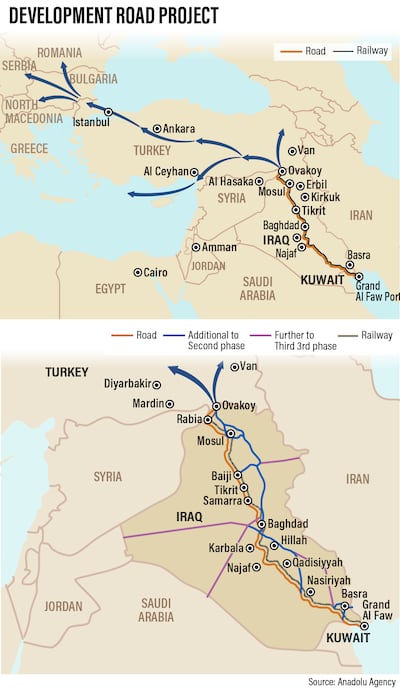
“In that time, the Red Sea’s interruptions may come to an end and international trade returns to normal, as well as threats to undersea cables,” he said.
“However, the interruptions to the Red Sea, I think, will keep interest in such alternative routes, both from a transport perspective and a telecoms one, alive well into the future.”
Hamzeh Hadid, visiting fellow with the Mena programme at the European Council on Foreign Relations, said the Development Road project received a boost when Turkey was left out of the Imec agreement at the G20.
The multibillion-dollar Imec rail and ports deal linking the Middle East and South Asia – which includes the US, the UAE, Saudi Arabia, India, Jordan, Israel and the EU – will look to create a shipping corridor to improve trade flows between Europe and India.
The Imec route, however, bypasses Turkey, which Mr Hadid said gave impetus to the Iraq project.
“All of a sudden, you just started to see the Turkish government really promote the Development Road to the point that there’s a lot of researchers actually making the mistake thinking it’s a Turkish-led project but it’s actually Iraq-led project,” he said.
Iraq, he said, wants to “be a connector in the region” in the hope of ”trying to bring in more Gulf investment”.
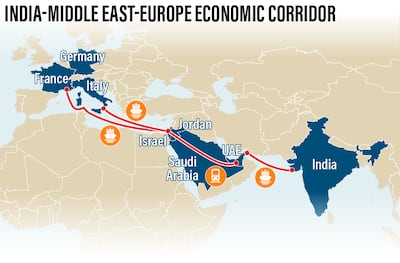
“Bringing in Gulf investment means firstly that the Gulf countries feel more invested in Iraq, so they’re more invested in Iraq’s stability. That’s the true ultimate thought process behind Iraqi policymakers,” Mr Hadid said.
“Secondly, the Iraqi market is completely dominated by Iran and Turkey and by bringing in more Gulf investment, it’s a form of taking away that Iranian-Turkish influence.”
Mr Hadid said since 1991, there has been a significant absence of Gulf investment in Iraq. He described it as “kind of like El Dorado” – a rich country with a big market that has not been tapped into.
Having recently returned to the US after spending four years in Baghdad, he noticed more Gulf investors expanding into Iraq.
“When I was there, I noticed all these American companies opening branches in Baghdad, like KFC, Pizza Hut, Cinnabon, Cold Stone Creamery and others and when I looked into it they were official branches from the Americana company that’s actually Kuwaiti, that brought in American franchises in the Middle East,” he said.
READ MOREAD Ports joins Iraq to develop Al Faw Grand port and its economic zoneBaghdad and Ankara set to sign agreements on water and security during Erdogan visitIraq woos China for transport project linking Asia to Europe
“The communication agreement kind of falls in line with the others. For example, the [$27 billion] TotalEnergies deal which Iraq signed [last year], QatarEnergy joined that. They have a 25 per cent stake in that.”
In 2021, the UAE announced $3 billion in investment projects for reconstruction in Iraq, while Saudi Arabia last year said it had set aside $3 billion for investment in Iraq through its Public Investment Fund, and later announced a $1 billion mixed-use project including offices, shops and more than 6,000 residential units.
Also last year, Qatar’s Estithmar signed initial pacts worth $7 billion to develop two new residential cities, five-star hotels and deals to manage and operate hospitals.
Connecting countries
The agreement with Kuwaiti company Zajil Telecom will create a connection along the same route.
Ms Al Yasiri, Iraq’s Minister of Communications, said last week the agreement is the first of many underwater and transit cables that aim to offer a connection for Gulf States, and southern and western Asia nations, to Europe via Iraqi land and seaports.
She said Iraq plans to install a submarine cable at Al Faw connecting to Saudi Arabia and enhancing links with Gulf states such as Oman, Bahrain and the UAE.
“The idea of terrestrial routes connecting Europe to Asia is nothing new,” said Paul Brodsky, senior research manager at the cable monitoring company TeleGeography.
“The majority of the connectivity between Asia and Europe goes by subsea cables. There are terrestrial alternatives to those but they tend to go through China, Russia, Eastern Europe, Belarus and Ukraine.
“As you can imagine, that presents some challenges for customers who don’t want the traffic going that way.”
A new terrestrial high-capacity fibre optic cable system was developed about 10 years ago that connects to Oman and goes through Iran, Azerbaijan, Russia, Eastern Europe and to Frankfurt.
“As an alternative to bypass to the Red Sea and Egypt, if you look at a map it makes plenty of sense,” Mr Brodsky said.
“But again, it faces the same commercial challenges and it never really did all that well commercially, for obvious reasons. It’s just a lot of customers that just don’t want their traffic going to Iran.”
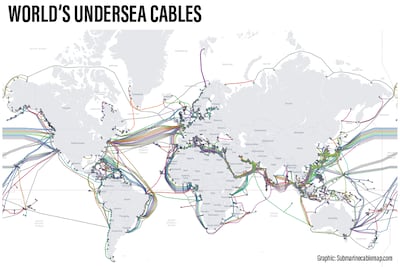
Bypassing the Red Sea would help avoid issues such as what happened in March, when four out of the 15 undersea cables carrying data between Asia and Europe were cut in the Red Sea, affecting 25 per cent of the data flow through the channel.
There are about 16 fibre-optic cables in the Red Sea which carry an estimated 17 per cent of all international data traffic from East Asia to Europe.
Mr Brodsky said creating an alternative is something that “the industry has been looking for for a long time”.
“Right now, a lot of traffic comes out of northern Iraq through Turkey and what this announcement really is – it’s opening up the southern two-thirds of Iraq, which is controlled by the Iraqi government,” he said.
“The northern third, as you know, is sort of semi-autonomous, but my understanding is that the ITPC, the government operator in Iraq, is allowing or has agreed to open up some capacity in the form of fibre pairs from the Kuwaiti border all the way to the Turkish border. So, presumably they have some deal with the Kurdish operators as well.”
Operators will share existing connections across borders to provide the network.
“It’s not like anyone’s laying a new network,” Mr Brodsky said.
“It’s really a matter of patching together fibre across different countries and then constructing one operable network.”
He said regional operators are now acquiring or leasing fibre pairs – used together to transmit data – through Iraq and then dealing with Turkish operators where they fail to acquire additional fibre pairs.
Updated: April 26, 2024, 6:45 AM

